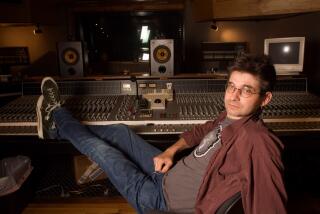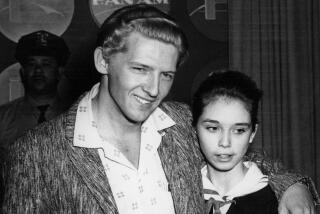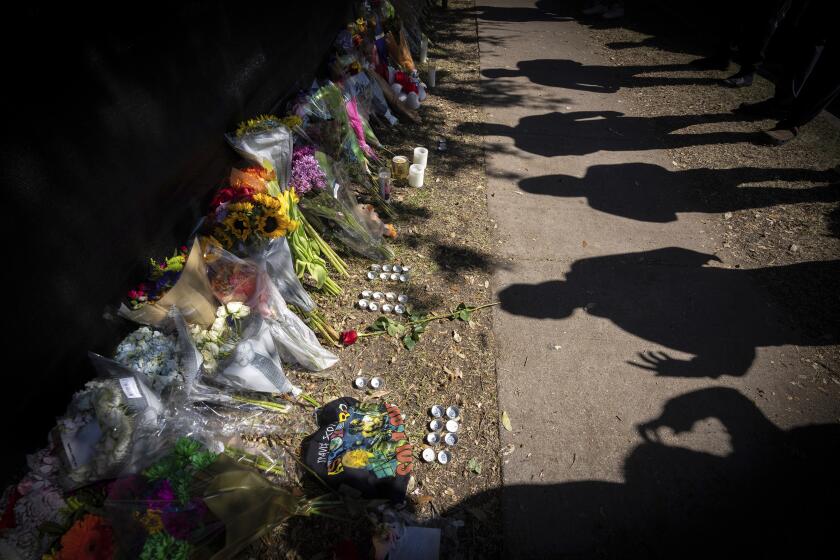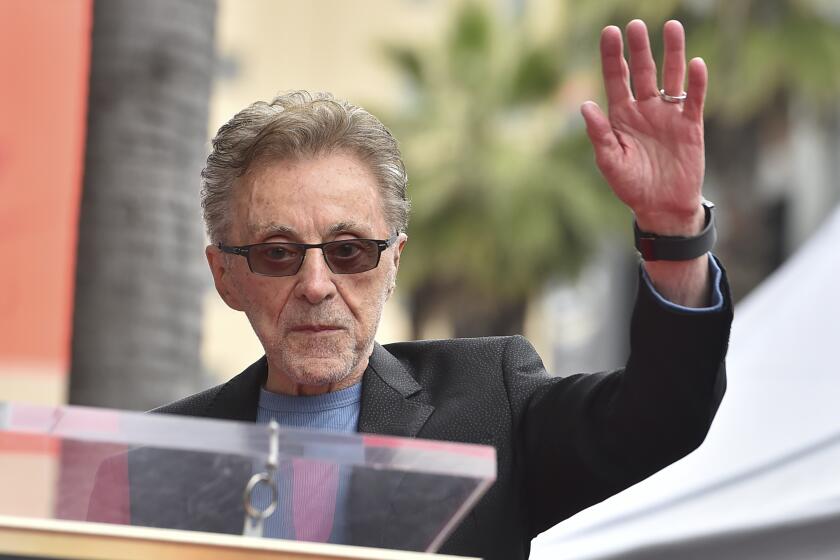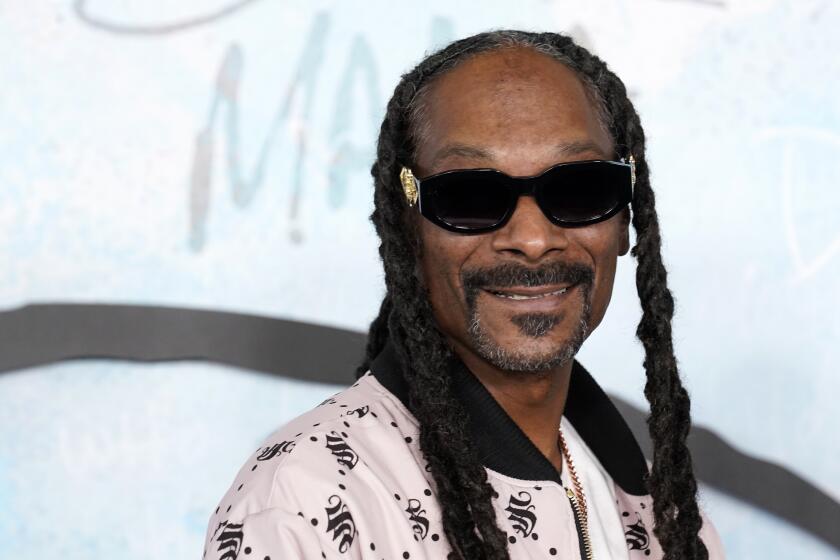John Doe’s Country Comfort : The linchpin of L.A.’s ‘80s punk-rock scene with ‘X’ has found new inspiration in the greener pastures of rural Ventura County
It’s a long way from Al’s Bar to Owl’s Barn, about 80 miles by freeway and country road from the downtown hub of the L.A. rock/art underground to the rural roadhouse that is now John Doe’s local watering hole.
But it’s about a million miles in spirit from L.A. to Rancho Doe Acres--the patch of land in Ventura County where Doe, 37, lives with his wife, Gigi, and their 2 1/2-year-old daughter, Veronica. A few neighboring houses cluster on two sides of the 2 1/2-acre, poplar-lined property, but to the south the terrain is all rolling hills, receding into the distance of Los Padres National Forest.
Doe--who was co-leader with Exene Cervenka of X, the band that served as the conscience of the L.A. rock scene for much of the ‘80s--hasn’t entirely renounced his old life. He has released his first solo album, “Meet John Doe,” on DGC Records, and he’s just started a national concert tour that includes shows at Club Lingerie in Hollywood on Monday and the Carnaval in Santa Barbara on Tuesday.
But these days he’s also busy tending to his two horses, the chickens and the rabbits, planning to pick up another load of hay while the price is down, lamenting the freeze that killed the tomatoes and the drought that kept the rye from coming up.
It’s hard to imagine a sharper contrast with the days when Doe was the punk era’s premiere chronicler of the psychology and sociology of teeming, turbulent Los Angeles. But he can spot similarities.
“There’s still as much excitement, it just comes in different forms,” he said, making a pot of coffee in the kitchen of his comfortably cluttered house as a hot, afternoon wind picked up outside. “Like the dogs cornering a raccoon and then flushing it out and tearing it to pieces. It’s still just as serious. Still happens late at night too.”
If Doe appears to have made a radical change, he claims that the seeds were there all along. It sounds like a punk-rock update of the hippies’ back-to-the-land impulse.
“Even in say 1978, Exene and (punk-blues singer) Top Jimmy and whoever was around, we always talked about moving to a small town or moving to the country. . . .
“The reason Hollywood was inspiring was ‘cause it was such a beast. You were in the heart of all that. It wasn’t a real love of it. It was inspirational in its insanity and its fast pace, and the fact that people can be a bum and then a millionaire.
“I always thought of Hollywood as a kind of a sentence, a prison sentence. You go in and you do your time and hopefully you can make your mark, and then you move out and someone else replaces you and they do their stint.”
If Hollywood was the inspiration for X’s music, where does Doe find it now?
“It comes from within. Stories, relationships. Things that you see when you’re in the big city,” he said, fitting a cigarette with a plastic mouthpiece--a do-it-yourself quit-smoking aid that hasn’t quite taken effect yet.
“Inspiration just kind of happens,” he continued. “People who painted battles didn’t set up a canvas on the battlefield. They went and saw it and then came back home and did it. That was the way all our writing took place anyway. You were within it, and then you had to step outside
of it to get enough quiet and peace of mind to actually put it down.”
On the side of the garage, hanging amid a display of antique farm implements, is the large, brown letter X that Doe liberated from the demolished Ex-Lax building in Brooklyn during one of the group’s tours. It’s the most prominent reminder at Rancho Doe Acres of the band that became the driving force and spiritual leader of the Los Angeles underground rock community.
“I don’t think you’re able to appreciate what a big deal people are making out of you at the time they do, because you’re kind of new to the whole deal,” the singer-bassist said, reflecting on the glory days.
“But I have the same perspective overall, because I knew that we were doing something worthwhile and it would stay around. . . . I think we did really well. We made some good records and the people who bought ‘em and listened to ‘em got a lot out of ‘em.”
Though even Doe slips into the past tense when talking about X, he insists that the band, whose last album came out in 1988, will reunite soon. He remains close to his ex-wife Cervenka--in fact, he was looking forward to singing on her album in Los Angeles the following night, with X’s guitarist Tony Gilkyson playing and producing.
The hiatus was prompted by a combination of events: Some acting roles came Doe’s way, Cervenka moved to Idaho and X’s last album, a live set recorded at the Whisky, seemed to summarize an era for the group.
Doe suggested that the Red Hot Chili Peppers are today’s truest heirs to X: “Not that the music sounds the same, but the fact that they’re living the life.”
He’s skeptical of the widely aired notion that Guns N’ Roses and the hard-rock hordes are carrying on the street consciousness of the punk bands.
“Certainly that scene is the next major scene, but I think that it’s all too much a part of the American dream to be right for me,” Doe said. “That could be why there can be 5,000 people walking up and down the Sunset Strip nowadays, and if that had happened in 1980 or ‘79, the police would have closed it down and hauled everybody off to jail. Because it was threatening, and it didn’t buy into the American dream, which is make a lot of money, flash it around.”
With the money he earned from his acting roles in “Roadhouse” and “Great Balls of Fire,” Doe made the down payment on his property and moved in a year and a half ago. He and Gigi, who still owns her thrift shop at the east end of Melrose, are expecting their second child in October.
“The whole deal of this is to have someplace to go, to maintain peace of mind,” he said. “Working on the road for a couple of months and then coming back to the city, that’s not much of a rest once you get back there. Hell, I only work so much out of the year, maybe six months out of the year. Why spend the rest of the time fighting traffic?
“I like the freedom that comes with fewer people and fewer city services. You end up doing things for yourself. No one cares to comment on whether I make the corrals well. It’s more relaxing.”
Doe spent his early childhood in small towns in Wisconsin and Tennessee, and didn’t get a taste of city life until his librarian parents moved the family to Baltimore when he was in the third or fourth grade.
“It was really a shock,” Doe recalled. “Kids were sarcastic. I never even knew there was such a thing as sarcasm. So I was taken advantage of, you know. That adds to your character in that you become more wary, but you still maintain this basic belief in people, that they’re good.”
Doe seems faintly embarrassed by his record company’s attempt to play off the album’s title by portraying him as a sort of post-punk Gary Cooper, an archetype of the “common man.” But it’s not totally off base. Doe’s heritage is Woody Guthrie and Leadbelly as well as Elvis and Bo Diddley, and there’s a salt-of-the-earth sincerity in his left-wing idealism.
“Meet John Doe,” though, is predominantly an introspective album, which seems to trouble its maker.
“I felt like I was remiss, but there were a few (political) songs that were left off because they didn’t seem to fit in. I just hope people are aware enough so they can say, ‘Even though there’s no political statements on this, it doesn’t mean that he’s shying away from it.’ ”
Outside, the wind suddenly began to whistle loudly, and it brought Doe back to the earlier question of inspiration.
“The thing is, out here natural things become symbolic. Like wind or weather, animals, things like that. Not using it in an idyllic sense or in a naturalistic sense . . . not where it’s just nice to be out in the country, but where it can be life and death and it can be serious business.
“Hopefully you don’t experience it to that degree . . . but you can take it to an extreme conclusion. Those aren’t necessarily truer or more basic feelings because they’re natural. But they’re powerful, strong forces.”
More to Read
The biggest entertainment stories
Get our big stories about Hollywood, film, television, music, arts, culture and more right in your inbox as soon as they publish.
You may occasionally receive promotional content from the Los Angeles Times.

